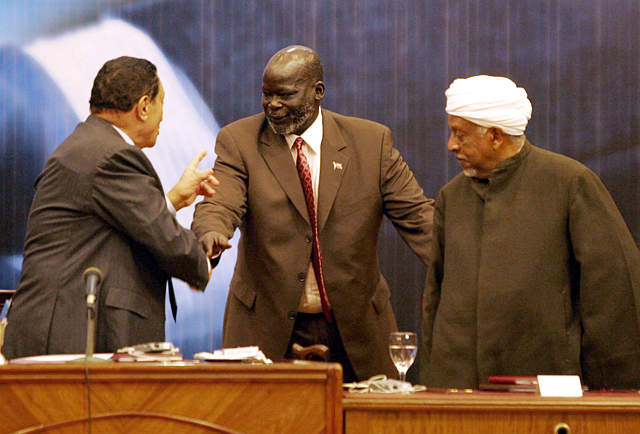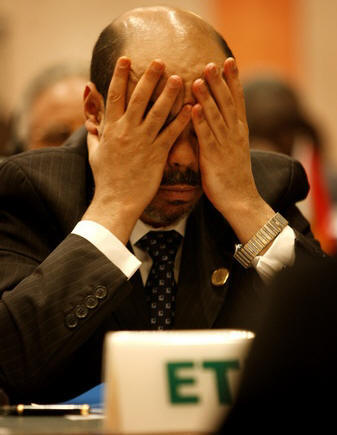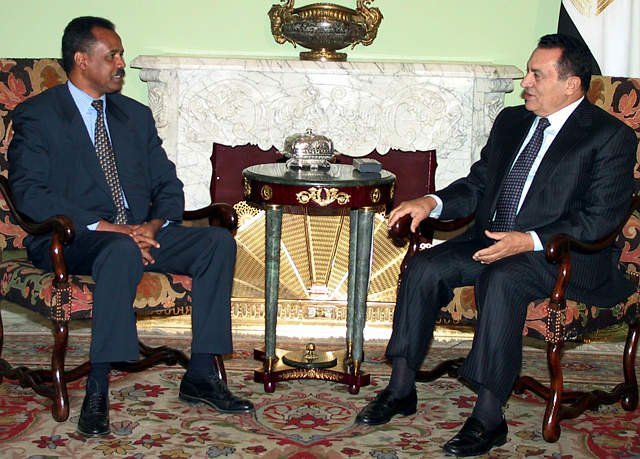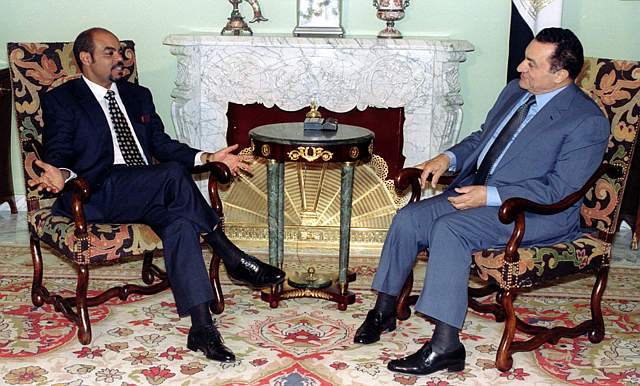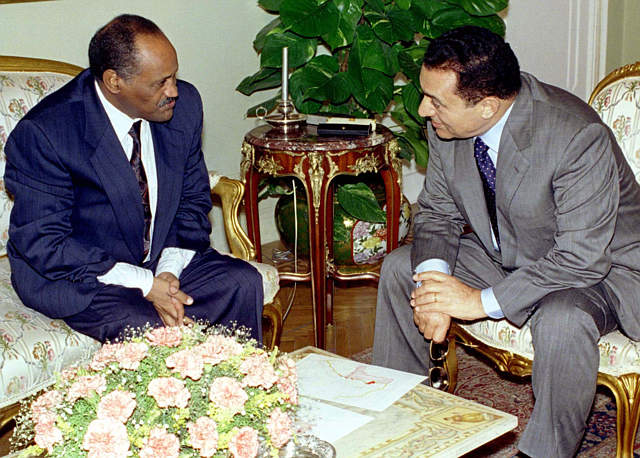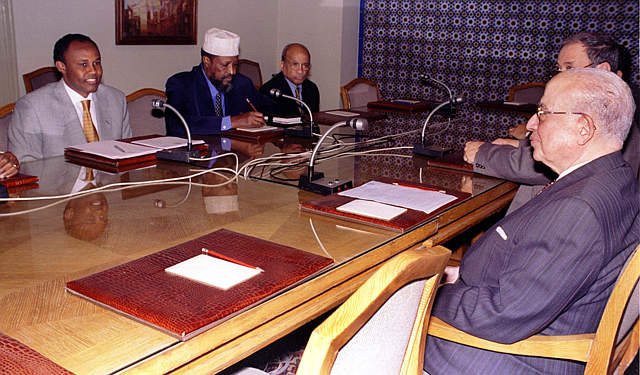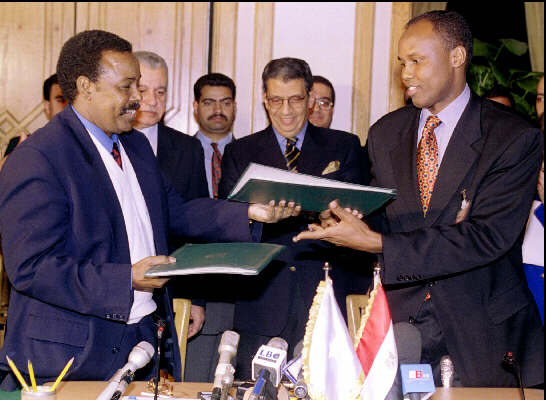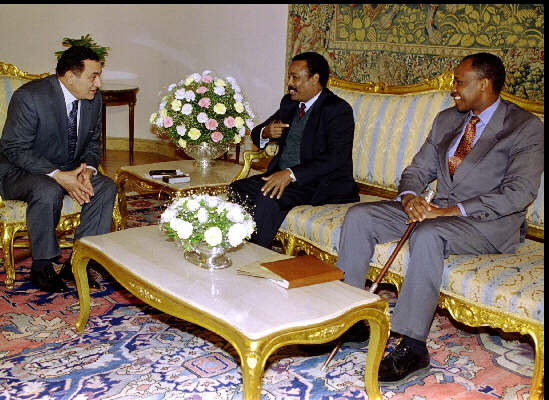|
Egypt and the Horn |
|
E G Y P T A N D T H E H O R N O F A F R I C A
Egypt's President Hosni Mubarak (R) meets his Eritrean counterpart Esayas Afewerki in Cairo November 13, 2002. The two leaders discuss the latest developments in Sudan and Somalia problems as well as bilateral relations between the two leaders' countries. REUTERS/Mona Sharaf
Egyptian President Hosni Mubarak (R) listens to Ethiopia's Prime Minister Menes Zenawi May 18. Mubarak is trying to find ways to end the African country's border war with Eritrea.
Egypt And The Horn Of Africa - The True Perspective Addis Tribune August 10, 1998
Addis Ababa - I am writing in connection with the article which appeared on three consecutive issues of Addis Tribune beginning June 26, 1998, under the heading "Egypt and the Horn of Africa" [see below].
There is nothing new in its contents and is more or less in line with similar articles that have been published for some time now with the sole purpose, it seems, of discrediting Egypt and criticizing its policies. As a matter of principle, I usually refrain from responding to such editorials for the mere reason that it is neither my intention nor style to conduct our foreign policy through the media.
However, and as an exception, I decided to respond to your article because although under the title commentary and opinion, it contains a great deal of misinformation and disinformation which I felt should not be left unchecked. It was mentioned that Egypt is the only country left in Africa, with imperial pretensions, with particular reference to Sudan. It is to be recalled that among the very first acts of the 23rd July Revolution of 1952, was granting Sudan self determination in 1953, which culminated in its independence in 1956, far ahead of most African countries.
Egypt's support for the decolonialization and independence of Africa, the elimination of apartheid and preserving the territorial integrity of Zaire and Nigeria, to name but a few, is a historical fact difficult to deny even by a biased commentator. In the fifties and sixties, Cairo was the Mecca of most if not all the liberation movements. 5 Heshmat Street, Zamalek, is a living testimony to that up to this day.
The establishment of the OAU, through the collective efforts of Egypt and its African sister states and Egypt's support for the Organization as a continental mechanism for political independence and economic and social development is yet another testimony of the true nature of Egypt's African policy. Egypt has no territorial claims on any African soil and has been living within its historical and undisputed boundaries for decades.
Indeed, as you rightly mentioned, the concern with the Nile waters is not just a national security issue but rather a national survival obsession. After all, we depend on the Nile for 97% of our waters. Before elaborating on our water policy, let me remind you that the water issue is an international concern and not only among the Nile Basin riparian states. Over the years several attempts were made to reconcile the interests of the upstream and downstream states for their mutual benefit
In this regard, the United Nations International Law Commission spent more than 20 years in preparing a draft frame-work agreement for the non-navigational uses of international rivers which was adopted by the United Nations General Assembly in 1996, and remains to be endorsed possibly by a conference of contracting parties. The frame-work agreement calls upon the riparian states of a given river to negotiate among themselves to reach an agreement on the management and utilization of the waters of the river, and taking into consideration the characteristics of each river and on the basis of an unexhaustive list of elements. Egypt recognizes that the Nile is shared among its ten riparian states and that each has the right for the equitable utilization of its waters in accordance to international law.
Egypt recognizes further that the existing water agreements do not hinder the utilization of the Nile waters by any of the riparian states nor regional cooperation among them for the optimum use of the natural flow and existing potentials. It is worth mentioning that the total precipitation over the Nile Basin is estimated to be 1600 Billion cub. mts out of which only 84 Billion cub. mts reach Aswan. The individual's water share in 1990 was about 920 cub. mts for Egypt compared to 3970, 3500,3000 for Sudan, Uganda and Ethiopia respectively. Egypt's share of 55.5 Billion cub. mts is in accordance with international law and agreements, historical and natural rights. The waters needed for the ongoing Peace Canal and Toshki will be within Egypt's share and through water savings and recycling.
Agreement was reached between Egypt and Uganda for the construction of the Owen Dam in 1953. Another agreement for increasing the dam's hydro electric power capacity by 50% was concluded in 1991. The construction of a 400 mega watt hydro electric power station, costing 450 million dollars, is under way by an Egyptian firm which also leads a consortium to provide the financing.
Similarly, an agreement was reached between Egypt and Sudan in 1959 regarding the sharing of the Nile waters, the construction of several dams along its course, exploiting its existing potentials, as the case with the Jongeli Canal, and the establishment of a joint committee to oversee the implementation of the agreement. Egyptian and Sudanese water experts are stationed in each others' country for that purpose.
As compared to the 1929 agreement between the two countries Sudan's share rose by 450% and that of Egypt by only 17%; the additional waters resulting from the High Dam estimated at 22 Billion cub. mts were shared at a ratio of 1:2 in Sudan's favour.
While I appreciate your concern and keenness about Sudan's interests, I can assure you that our water relations are excellent, will continue to be so and definitely can do without interference. In the same endeavour a frame-work agreement of cooperation was concluded between Egypt and Ethiopia in July 1993, to consider the water issue in accordance with international law and promote bilateral and regional cooperation among the riparian states. Experts held two rounds of talks but their meetings were suspended at the request of Ethiopia. Egypt expressed readiness to cooperate with Ethiopia in exploiting its huge hydro electric power potentials and a standing invitation to the Ministers of Energy and Water Resources has been extended since 1994.
Egypt did not object to the World Bank's financing of Ethiopia's hydro electric power stations nor small scale water dams. Since the early sixties several attempts were made at the regional level to address the water issue, sometimes with the assistance of United Nations specialized agencies such as WHO, FAO, UNDP, UNEP or donor countries, particularly Canada. Two mechanisms were agreed upon the HYDROMAT and its successor TECHONILE. Regrettably results were below expectations in view of Ethiopia's position.
It is worth mentioning that the Techonile action plan, adopted in 1995, contained 23 projects one of which was the establishment of a regional organization for the management and development of the Nile waters and with a specific mandate for the consideration of water allocation. The Techonile Ministerial Meeting in Arusha February 1998, in which Ethiopia participated as observer, decided to draft an agreement for the establishment of a regional organization comprising the ten riparian states including Ethiopian. I sincerely hope that this latest endeavour will succeed.
Only through regional cooperation can we untap the huge water potentials of the Nile for the mutual benefit of all its riparian states. There is urgent need to carry out the many water projects, most if not all of which have been identified at the turn of the century. However, such projects can not be carried out and benefited from in the absence of peace, security and good neighbourliness. May I remind you that the Jongeli Canal project in the Sudd had to be brought to a halt because of the ongoing fighting in southern Sudan. Egypt and Sudan had spent 300 million dollars on the project and were supposed to benefit 3.8 Billion cub. mts of water per year as of 1984, i.e. over 50 Billion cub.mts. have already been wasted.
I, therefore, fail to understand how Egypt can be engaged in destabilizing the upstream riparian states as a means of ensuring its water security. How possibly Egypt can benefit from the Somalia crisis, the Ethio-Eritrean dispute or the civil wars ravaging in any of the riparian states as related to its water policy. While Egypt is interested in regional cooperation regarding the Nile waters, it is even more interested in wider cooperation among the Nile Basin countries regarding socio-economic development. This was manifested in its support of the UNDUGO, established in the early eighties, comprising the riparian states with the exception of Ethiopia.
However, by the early nineties, several of the UNDUGO members opted for and gave prominence to an alternate mechanism for regional cooperation namely IGAD with the participation of Ethiopia, Somalia and Djibouti. Egypt welcomed that development and is looking forward to its own membership in the organization at the appropriate time and, meanwhile, Egypt is promoting its relations with IGAD member states bilaterally. The second part of the commentary will continue next week.
Copyright(C) 1998 ADDIS TRIBUNE. © 1998 Chamber World Network International Ltd
Egypt And The Horn Of Africa, Part Three Addis Tribune July 10, 1998
Addis Ababa - Metropolitan Egypt: Sub-Saharan Africa is the poorest region of the world. Major donor countries have realized that special measures are needed to help sub-Saharan Africa emerge from poverty.
The continent needs debt relief, measures to protect social services during structural adjustment, concessionary finance, and a range of other assistance measures. European donors therefore planned a special conference, scheduled for the year 2000, to promote a new aid and economic agenda for sub-Saharan Africa. This will be the first such initiative after the introduction of the new Euro currency in the European Union: it will set the tone for the entire EU policy towards Africa for the coming century.
North Africa-the southern shores of the Mediterranean-also needs economic assistance. But its needs are very different from the African countries to the south, and its trade relationship with Europe is very different. Recognizing this, Europe planned to confine its initiative to Africa south of the Sahara.
Egypt has other plans. At the OAU Summit, Egypt took advantage of the way in which most delegates were distracted by the Eritrea-Ethiopia conflict, and quickly pushed through a plan that will mean that the Europe-Sub-Saharan African economic conference will be held in Cairo. What does this mean?
Hosting the conference in Cairo will mean that sub-Saharan Africa will not get the attention that it requires. Egypt will not be so crude as to try to claim a share of the resources on offer. That would be too obvious. Instead, it has a different plan-and one with more serious implications for Africa, and particularly the Horn.
In the post-Cold War world, the Americans and Europeans have lost strategic interest in Africa. For most of the 1990s, there was simply no coherent European or US policy at all towards Africa. (The exception was France, which was trying-and failing-to maintain its special relationships with west and central Africa.) Instead, policy drifted, buffeted by events and special interest lobbies at home. At last, in 1997, a new American policy began to emerge. It was centered on the 'new African leaders', on what appeared to be a solid alliance between Asmara, Addis Ababa, Kampala and Kigali. Number one on the political agenda was Sudan. This was a direct challenge to Egypt. until then, Egypt had enjoyed a privileged place in US policy, because of the 1977 Camp David accord with Israel, suddenly that position was under threat.
With the eruption of the Eritrea-Ethiopia conflict, Egypt will surely be active in trying to woo the Americans back, to support it as the sole guarantor of stability in the Horn.
But beforehand, Egypt had already responded by stepping up its contacts with the Sudanese parties. On a wider scale, it also aligned itself more closely with France, which is trying to take the lead in creating a new European policy towards Africa. France's efforts have been targeted on what it sees as the emerging subregional powers in Africa: Egypt, South Africa and Nigeria. (Nigeria has officially adopted French as its second language-making it officially the largest French-speaking country in the world!) The agenda? South Africa is the guarantor of stability and prosperity in southern Africa. Nigeria can play the same role in West Africa. Egypt will be happy to do the same in northeast Africa.
But there is a big difference between the role that South Africa will play with the SADC countries and the role of Egypt and IGAD and its members. South Africa sees the SADC countries as its historical friends, its strategic allies and its partners in achieving common prosperity in the region. As South Africa develops and solidifies its democracy, the entire region will benefit.
For Egypt, regional politics is a zero-sum game. Northeast Africa's gains are Egypt's loss, and vice versa. Egypt does not want to strengthen IGAD, but reduce it to a hollow shell. Egypt does not want regional integration and common prosperity: it wants weak, divided and impoverished countries in the Nile Valley and the Horn of Africa. In particular, it wants to control Sudan and undermine Ethiopia. Eritrea should see that Egypt's backing is purely opportunistic: Egypt's only interest is in creating dissension. Where Egypt sees emerging unity, it will foster division. Where it sees prosperity and development, it will insist that investment is futile and relief handouts are the only option.
Egypt must reconsider hosting the year 2000 Europe-Africa Summit. In the last five years, Cairo has been the location of many prestigious international conferences and summits-it does not need more. Its unseemly rush to seize this chance looks like nothing other than its appetite for domination. Africa need not resign itself to this important summit being held outside sub-Saharan Africa, and push for it to be held elsewhere.
The regional vision for northeast Africa has suffered an immense setback with the conflict between Eritrea and Ethiopia. Egypt stands to gain. If Egypt can become the intermediary for European economic policies towards northeast Africa, it will gain more-at the expense of the people of the region. If Egypt can also persuade the Americans and French to make it the guarantor of the security of northeast Africa, then the recolonisation by Egypt will be complete.
Instead, Egypt should recognize that domination couldn't bring stability. A peaceful and prosperous Horn of Africa is in its long-term interest. Its short-term political calculation must therefore change: it should not overplay its hand, and instead seek a partnership, starting with Ethiopia.
Copyright(C) 1998 ADDIS TRIBUNE. © 1998 Chamber World Network International Ltd
Egypt And The Horn Of Africa Addis Tribune July 03, 1998
Addis Ababa - PART TWO-SQUEEZING ETHIOPIA: The arithmetic of the Nile flow creates a zero-sum game, which Egypt is determined to win. This game has its own political logic: Egypt must have a hegemonic relationship with the Nile Valley and the Horn of Africa. The same colonial calculations that drove British policy have influenced Egypt.
Egypt has always used its presence on the African landmass, together with its Arab links, not to bridge the gaps between the Africa and Arab spheres, but to manipulate one against the other. This came out clearly when the Inter-Governmental Authority on Development (IGAD) was reinvigorated in recent years. Egypt was not happy with this development: it tried to force itself on the IGAD members, not as an equal partner, but for purposes of domination. In Sudanese and Somali conflicts, the Egyptian role has not been to address the problems of these countries and their suffering people. It has been first and foremost to sabotage any possibility of IGAD finding a solution, which would increase Ethiopian influence-as Egypt sees it, at its own expense. Egypt will now try and use the conflict with Eritrea in the same way.
The Egyptians have proudly boasted that no government has changed in Sudan without their hand in it. One could scarcely ask for a more open admission of a colonial mentality.
In 1995, the Eritreans helped the Sudanese opposition come together and agree on a common platform, formalized in the 'Asmara Declaration'. After the assassination attempt on Hosni Mubarak in Addis Ababa at about the same time, the extent of Sudanese government destabilization in Ethiopia also became clear, and Ethiopia formed a common front with Eritrea and Uganda in supporting the Sudanese National Democratic Alliance (NDA) against Khartoum. There was a real prospect that there would be a change of government in Sudan-without Egyptian blessing. )From the Egyptian point of view, an NDA government would also become part of a new Horn of Africa axis-an alliance between Addis Ababa, Asmara and Khartoum. Never before would Egyptian hegemony in the Nile Valley have faced such a challenge.
Egypt's first reaction to the assassination attempt was to blame Ethiopia! This reveals the instincts of the government's security services-which run its foreign policy. Egyptian policy may be slow, but it is determined. After a period of confusion-the attempted assassination of the President created panic and the government did not know what to do-a new policy emerged. It is clothed with the language of Arab brotherhood and peacemaking. But the aim was simple: to split the NDA and marginalise Ethiopia and Eritrea. The policy was beginning to bear fruit even before the Eritrea-Ethiopia conflict erupted. There were signs of reconciliation between Hosni Mubarak and President Omer al Bashir. The leader of the opposition Democratic Unionist Party, Mohammed Osman al Mirghani, has always been under Egyptian patronage, but two other NDA leaders-Sadiq el Mahdi and Dr John Garang-have been historical adversaries of any Egyptian role in Sudan. But in recent months they have both been honored guests in Cairo. Simultaneously, Garang's relations with Asmara and Addis Ababa were cooling. Turning to Somalia, Egypt has a long-established involvement in the affairs of the country. The official Egyptian line is that its role has been solely to promote cultural and educational exchanges, and to work for peace. But a closer analysis suggests a very different motivation.
President Siad Barre received extensive and loyal support from Egypt, including weapons, military training and economic assistance. The aim was simple: to maintain leverage on Ethiopia, and prevent Ethiopia from achieving stability. When Siad Barre fell, Egypt was active in trying to put in Ali Mahdi as new president. The reason? The logical successors to Siad Barre were Abdirahman Tuur of the Somali National Movement (SNM) and Mohammed Farah Aideed of the United Somali Congress (USC), whose forces had actually done the fighting that had driven Siad from power. But Ethiopia backed both the SNM and USC. And Egypt has a kneejerk response to any political development in which they see an Ethiopian hand: it must be stopped.
In 1993, after the U.S. Marines had intervened in Somalia, they handed over to the United Nations. At the time, the Secretary General was Boutros Boutros Ghali. The Egyptian hand could be seen in what happened next. UN policy quickly tilted towards Ali Mahdi. Although General Aidid was the de facto ruler of most of southern Somalia, the UN was determined to isolate him. Although the SNM had established peace and stability in northwest Somalia, declaring the independent Republic of Somaliland within the former British colonial boundaries, the UN did all it could to undermine and destroy Somaliland.
In the last three years, Egypt's main goal in Somalia has been-publicly-to promote peace. But if we look closely we see that every single one of its actions has been aimed at undermining any peace process supported by the Ethiopian government. When the Sodere Negotiations, sponsored by Ethiopia, were at the point of success, the Egyptians stepped in and brought the factions to Cairo and floated a new deal. Both deals collapsed: but Egypt had what it wanted, it had thwarted Ethiopia.
Ethiopia has a long history of independence. Egypt cannot control it in the same way as Sudan or Somalia. So it is the biggest threat to Egyptian hegemony over the Horn. And in turn, Egypt's strategy is not to control, but to subvert. When Ethiopia is consumed with its own affairs, weak and internally divided, Egypt can rest. When Ethiopia is prosperous and self-confident, playing a leading role in the region, Egypt is worried. Over the last seven years, with Ethiopia emerging as a leading regional force, Egypt began to search for any opportunity to sabotage Ethiopian ambitions. The conflict with Eritrea has given it a golden opportunity.
At the recent OAU Summit in Ougadougou, Burkina Faso, African countries expressed their sympathy for Ethiopia in the face of Eritrea's aggression. There was one exception: Egypt. Egyptian representatives spent their time warning their fellow diplomats darkly that Ethiopia would fall apart into chaos. Why? The eruption of the Eritrea-Ethiopia conflict suddenly gives Egypt a new opportunity. Eritrea's role gives them new leverage over Ethiopia. Divide and rule-the colonial instinct comes out again. Focussed on the conflict with Eritrea, Ethiopia will not be able to play a leadership role in the region. Bad news in Ethiopia is good news in Egypt.
By rights, Egypt should be able to play a constructive role in northeast Africa commensurate with its size and historic importance. But to do so the Egyptian government has to shake off this inherited imperial mentality, and especially its negative role targeted towards Ethiopia. Then Egypt will discover that its people have many interests in common with Ethiopia, and that the two countries can work together in many areas in pursuit of common prosperity.
Copyright(C) 1998 ADDIS TRIBUNE. © 1998 Chamber World Network International Ltd
Egyptian President Hosni Mubarak (R), trying to mediate a ceasefire between Eritrea and Ethiopia, meets June 14 Eritrean Foreign Minister Haile Woldensae, two days after holding talks with an Ethiopian envoy on the conflict. Woldensae shows Mubarak a map of the disputed territories.
EGYPT-SOMALIA:CAIRO,5NOV98-Somali faction leader Hussein Aideed (L) smiles at Arab League Secretary General Esmat Abdel-Meguid (R) during talks November 5 at league headquarters in Cairo, where Aideed is trying to drum up Arab support for a reconciliation conference among the African country's feuding factions.
Somali leader Hussein Mohammed Aideed from the National Salvation Council (NSC) (R) and his main rival Mohamed Ali Mahdi (L) exchange documents after signing a peace agreement December 22 in Cairo to safeguard Somalia's independence and sovereignty as the Egyptian Foreign Minister Amr Mousa (C) looks on. The factions plan to hold a reconciliation conference in February aimed at rebuilding state institutions shattered by six years of clan warfare.
President Hosni Mubarak (L) meets with Rival Somal faction leaders Hussein Mohammed Aideed (R) and Ali Mohammed Mahdi (C) in Cairo December 25. The two leaders signed peace accords in Cairo on December 22 to safeguard the independence and sovereignty of their country.
|
